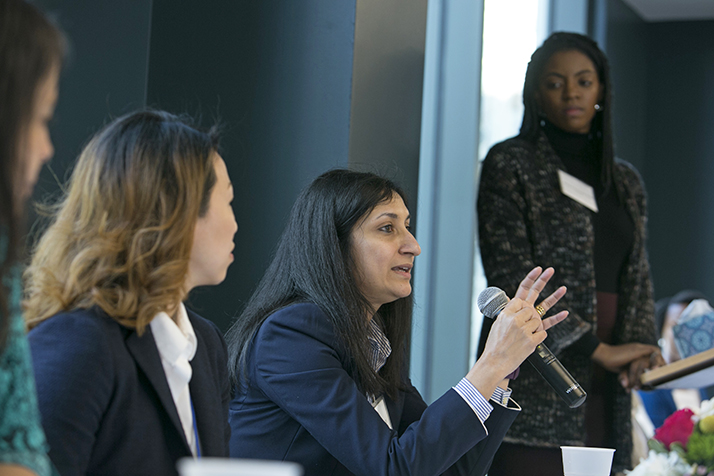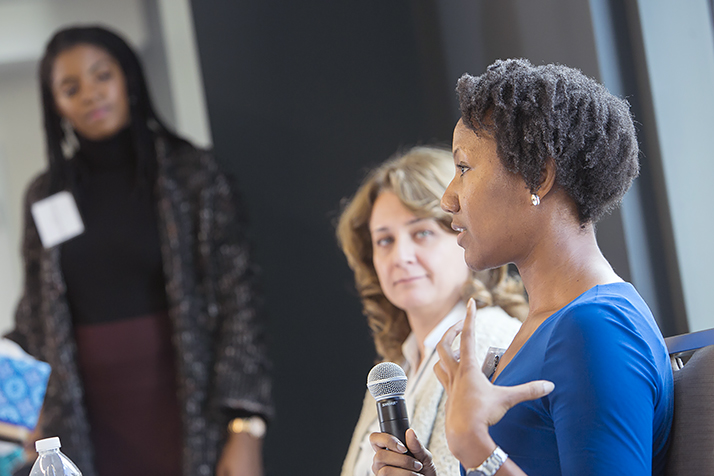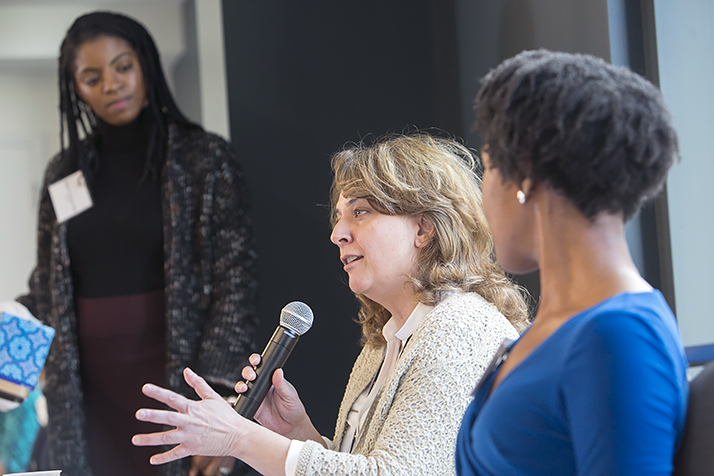Duke Women Share Their STEM Journeys
Employees and alumni discuss science, tech, engineering and math careers with students

“So how many of you in this room, if you go into a STEM career, will be the first person in your family to be in that sort of career?”
Sherilynn Black, director of the Office of Biomedical Graduate Diversity in Duke’s School of Medicine, directed the question to about 20 Duke female-identified students on Wednesday afternoon. Most raised their hands.
The conversation in Penn Pavilion was part of the second annual SHE (Share, Hear, Empower) Luncheon for Duke female-identified student leaders. The panel discussion covered issues facing women and women of color in science, technology, engineering and math (STEM) careers. About 25 students and staff members attended the event, which was organized by the Duke Center for Multicultural Affairs. A panel of Duke employees and alumni shared advice from their career paths.
Johnna Frierson, director of diversity and inclusion in Duke’s Pratt School of Engineering, moderated the discussion. Before the event began, she reminded the audience that their academic and career goals are important and worthy of pursuit.
“There is space for you,” Frierson said about women working in STEM fields.
Students asked panelists about negotiating salaries, advice they would give to younger versions of themselves, how to maintain a person’s identity in the workplace, and how to confront a peer when there is a communication issue.
Here are some takeaways from the discussion:

“Sometimes people just say things in a really off-hand manner, not really intending to offend a specific person. … Have that one-on-one honest conversation with the person sooner rather than later because if these things fester, the work environment can change permanently for you. It just keeps festering. Maybe it’s just my nature, I’m not very confrontational, but I’d much rather not do it in a big group setting because that puts someone in a very defensive mode and it just doesn’t solve the problem. And at the end of the day, this is your team, so it’s not one interaction and it’s over. You have to work with this group for weeks, months, years, so look at long-term solutions.”
Rukmini Balu
Chief of staff, Office of Duke Chancellor for Health Affairs Gene Washington
--

“When I started graduate school, none of the schools that I applied to ever had a black female to get a Ph.D. in their department, none of them, and I’m not that old. And every single school that I went to, I remember being really excited about what the possibilities were and going on these interviews and beginning to realize, wait a second, there is literally no one that looks like me in any of these departments. … I really had to dig deep and work a lot, really hard, to know that I belonged, and no matter what you all end up doing, you might be the first female. You might be the youngest person. You might be the first person of your race. You might be the first generation in your family. That is OK, because there are lots of us that have held that role in some capacity in our lives.”
Sherilynn Black
Director, Office of Biomedical Graduate Diversity, Duke School of Medicine
Assistant professor of the practice in Medical Education, Duke School of Medicine
Completed her doctoral studies in Duke’s Department of Neurobiology
--

“Women usually don’t ask for things the way men do. When you are offered a job, sometimes the reaction from women is, ‘Oh, thanks! You got me a job! I’ll take whatever.’ And men are like, ‘I’m looking a little first, so you need to bump up my offer by this amount. If not, I won’t take it.’ It’s a lot up to us to ask for what we want. I have found that sometimes it’s easier than it looks. … Just ask for what you really want and be clear about your expectations.”
Erika Franco
Duke alumna (graduated with a master’s in engineering management in 2008)
Senior test engineer in IoT Vertical Solutions Group, Cisco Systems Inc.
--

“Make sure women are not responsible for the life part and men for work. Make sure whoever your partner is, wherever you go, there is a balance. In other words, if you want to move, that’s great, but make sure it’s not always to improve your partner’s situation.”
Negin Martin
Former Duke postdoctoral fellow
Acting director of Viral Vector Core Lab, National Institute of Environmental Health Sciences, National Institutes of Health
--

“I don’t purposefully use my Brooklyn accent. It comes out when I’m angry. And I can do the Chinese accent, too, and I love doing it. I think that we all have multiple dimensions to ourselves. It’s strategic, really. If you’re able to morph, it’s part of a dimension of you and it’s nothing bad. … I encounter this a lot of the time in the classroom. When somebody looks at me, it’s not uncommon for students to see me and not expect me to talk the way that I do and to be as tough as I am. … You start getting more and more comfortable with all these dimensions that make you who you are.”
Minna Ng
Assistant professor of the practice, Duke Institute for Brain Sciences
Assistant academic dean, Duke Trinity College of Arts and Sciences
--

“My advice to my younger self would be to not be afraid to fail. Embrace those challenges and not be so afraid to fail that you’re too afraid to try, specifically in the sciences. If you’re in research, your experiment is going to fail many times, actually, before you get to that successful place and before you get to that place of celebration. … I think there’s a quote someone said, that ‘Perfection is the enemy of greatness.’ To my younger self, I would really say it’s not about perfection. It’s about being courageous in the decision that you’re making.”
Johnna Frierson
Director of diversity and inclusion, Duke Pratt School of Engineering